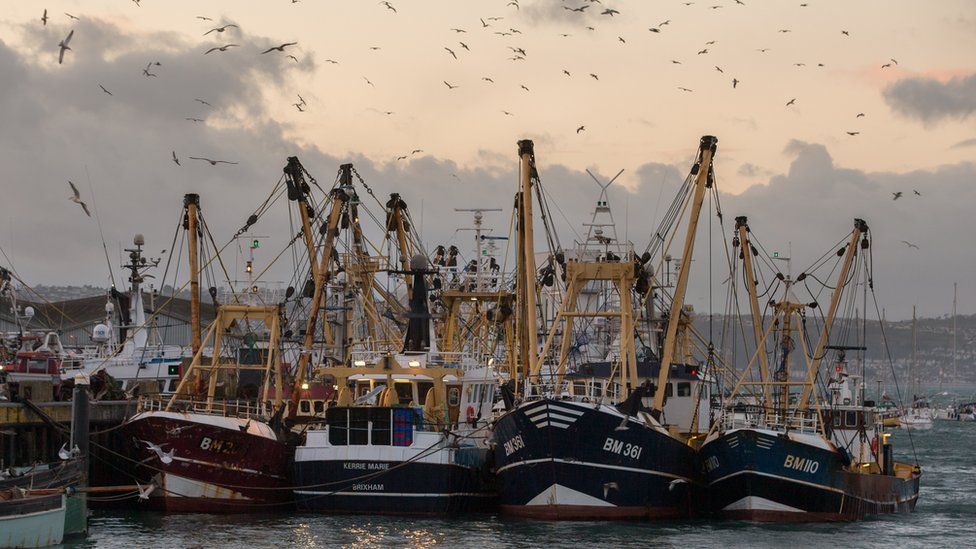Will the UK and EU reach a Brexit deal on fishing?
- Published

The EU 27 are concerned that "taking back control" of the UK's waters might mean fewer fishing opportunities for their fleets. A diplomatic note - seen by the BBC - raised concerns about access and environmental commitments.
The prospect might be a surprise to them, focused on 585 pages of draft agreements, but it's been the backbone of the economic argument for the UK's most pro-Brexit industry. Many have said it would be the litmus-test of the whole process.
The waters around all the EU's member states, up to a limit of 200 miles, are effectively "pooled" when it comes to fishing. It means boats from one country can fish in another's seas.
When the UK leaves the EU, barring any new agreements, those waters will exclusively become the UK's again, under the United Nations Convention on the Law of the Sea.
There's also a further separate international agreement, called the London Fisheries Convention, covering the 12 miles closest to the shore. It's being terminated, meaning no foreign vessel will be allowed to fish in UK waters without the UK's permission.
A long-running fear among skippers has been that their fishing rights would be "traded away" in deals done for the benefit of more economically valuable sectors. The draft withdrawal agreement seems to rule that out but it doesn't mean foreign boats will be immediately chased away by British vessels.
None of the industry bodies has advocated allowing only UK boats to fish in our exclusive economic zone - the sea up to 200 miles from UK shores. What they want is for the UK - or the nations of the UK - to decide who is and isn't allowed in.
When Greenland left the EU, in 1982, it allowed limited access to its waters in exchange for infrastructure funding. Greenland initially held all the quotas for its exclusive seas but effectively sold off some.
A similar negotiation is proposed between the UK and EU but there is no commitment to reaching a deal. The document simply says the two parties will "use their best endeavours" to do so.
There will have to be flexibility as British boats don't just fish in British waters. The recent scallop skirmishes in the Baie de Seine, which resulted in tussles at sea between French and British fishermen in a row over access to fishing grounds, illustrated the need for cross-border cooperation.
The fishing industry in towns such as Fraserburgh, Peterhead and Grimsby will see Brexit as a success only if their harbours are filled with more local boats in the years ahead.
Important too is the link being made between fishing opportunities for EU vessels and the sale of fish and seafood by the UK into the EU.
It's unlikely the prominence of fishing will crumble in the wider noise of securing a trade deal, mainly because most of the industry is in Scotland.
The block of 13 Scottish Conservative MPs, including the Scottish Secretary, David Mundell, have repeatedly taken a tough collective stance with the prime minister over the issue, only last week restating that it would be a "betrayal" if the EU retained any control over fishing rights.
Those 13 Tories have a stronger voting power than the 10 DUP members keeping Theresa May in office.
And looming over all this is the threat of a second referendum on Scottish independence. It would be of great political benefit to the SNP if it was able to claim the fleet had been "let down by Westminster" on fishing.
Of course, a general election could change the dynamic entirely but short of that its difficult to see any radical shift.
As for the environmental concerns, annually the quotas for fishing catches are based on scientific advice. That is, scientists prescribe how much of each stock - cod, haddock et cetera - can be caught sustainably. It then becomes a political negotiation over how to divide up the stock between countries.
It's difficult to argue with the scientists - although many often do.
But if the UK decides to conduct its own scientific research - and that contradicts the European Commission's - the negotiations could become sticky.
Until not so long ago, Iceland had a long running dispute with the EU over its rights to fish for mackerel when its own scientists detected changes in their migration patterns.
But because it was an independent coastal state, it held many of the cards and eventually secured a much larger share of the catch. It had muscle and used it.
So, should the EU 27 feel concerned about future fishing opportunities being restricted?
We don't know the answer yet. A lot is at stake - from fishing rights to market access - and so, the negotiations will be complex.
- Published25 November 2018
- Published15 November 2018